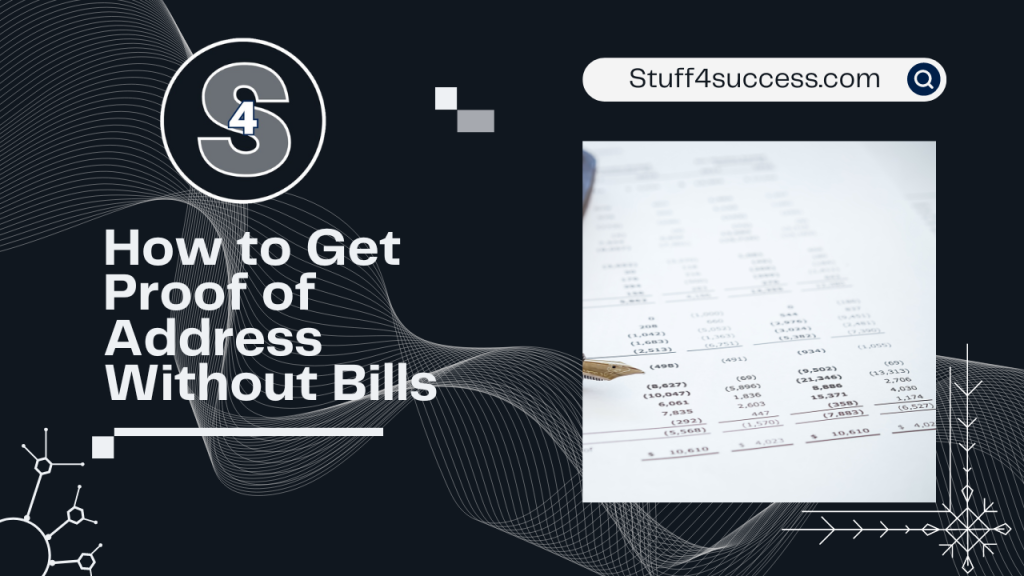Establishing proof of address is a common requirement in various situations, from opening a bank account to applying for a driver’s license or enrolling in educational programs. While traditional methods often involve providing utility bills or lease agreements, many individuals may face challenges if they don’t have these documents in their name. However, there are alternative ways to obtain proof of address without relying on bills. In this blog, we’ll explore creative solutions and practical strategies to help you navigate this process effectively.
- Understanding Proof of Address
- Why Is Proof of Address Important?
- How to Get Proof of Address Without Bills
- Common Scenarios Requiring Proof of Address:
- Are Online Bank Statements Accepted As Address Proof?
- Conclusion
Understanding Proof of Address
Proof of address is a crucial document that verifies an individual’s residency at a specific location, serving as essential documentation in various aspects of life. From opening bank accounts to accessing government services or enrolling in educational programs, proof of address is often required to comply with regulatory requirements, prevent fraud, and confirm identity. It provides validation of an individual’s residence, ensuring their eligibility for services, benefits, and rights associated with their locality.
While traditional utility bills or lease agreements are commonly used as proof of address, alternative methods such as government-issued identification, bank statements, employer verification, notarized affidavits, or letters from government agencies offer viable options for individuals who may not have traditional bills in their name. Understanding the significance of proof of address and exploring alternative documentation methods can empower individuals to navigate administrative and legal processes effectively, facilitating access to essential services and opportunities in their daily lives.
Why Is Proof of Address Important?
Proof of address serves several important purposes:
- Verification of Residency: It confirms your current place of residence, which is essential for various administrative and legal purposes.
- Identity Verification: It helps establish your identity when conducting financial transactions, applying for official documents, or accessing government services.
- Compliance Requirements: Many institutions and service providers have legal or regulatory obligations to verify customers’ addresses to prevent fraud, money laundering, or identity theft.
- Access to Services: Without proof of address, you may encounter difficulties accessing essential services such as banking, utilities, healthcare, and government assistance programs.
How to Get Proof of Address Without Bills
Utilize Official Government Documents
One of the most reliable ways to obtain proof of address is through official government documents. Consider obtaining a government-issued identification card, such as a driver’s license, state ID card, or passport, which typically includes your current address. These documents are widely accepted as proof of address and can be obtained through the relevant government agencies.
Obtain a Letter from a Government Agency
If you don’t have official identification with your current address, you can request a letter from a government agency confirming your address. This could include letters from the Social Security Administration, the Department of Motor Vehicles, or the tax office. Contact the relevant agency to inquire about their procedures for issuing address verification letters.
Bank Statements or Correspondence
While traditional utility bills may not be available, bank statements or correspondence from financial institutions can serve as alternative proof of address. Many banks provide online statements or mail correspondence to their customers, which can be used to verify your address. Ensure that the statements or correspondence include your name and current address.
Employer Verification
If you’re employed, your employer may be able to provide a letter or official documentation verifying your address. This could include employment contracts, pay stubs, or letters from human resources departments. Reach out to your employer to inquire about the possibility of obtaining address verification through employment documentation.
Notarized Affidavit
In some cases, a notarized affidavit signed by a third party can serve as proof of address. An affidavit is a sworn statement confirming your address, typically signed in the presence of a notary public. While requirements may vary depending on the jurisdiction, an affidavit can be a valid alternative when other forms of documentation are unavailable.
Consider Alternative Service Providers
Some service providers, such as virtual mailbox services or coworking spaces, offer solutions for individuals who need proof of address without traditional bills. These services provide a physical mailing address that can be used for correspondence and documentation purposes. Research reputable providers in your area to explore this option further.
Common Scenarios Requiring Proof of Address:
- Opening Bank Accounts: Most banks require proof of address when opening a new account to comply with anti-money laundering regulations and confirm your residency.
- Applying for Loans or Credit: Lenders typically request proof of address as part of the application process for loans, mortgages, credit cards, or other forms of credit.
- Setting Up Utilities: Utility companies, such as electricity, water, gas, or internet providers, may require proof of address to establish service at a new residence.
- Obtaining Identification Documents: Government-issued identification cards, driver’s licenses, or passports often require proof of address for issuance or renewal.
- Registering for Government Services: Proof of address may be necessary when registering for government benefits, social services, voting, or obtaining permits and licenses.
Are Online Bank Statements Accepted As Address Proof?
Yes, online bank statements are generally accepted as proof of address by many institutions and service providers. Online bank statements typically display your name, address, account information, and transaction history, making them a reliable form of documentation to confirm your residency. However, acceptance of online bank statements as proof of address may vary depending on the specific requirements of the institution or organization you are dealing with.
When using online bank statements as proof of address, it’s essential to ensure that the statements meet the following criteria:
- Current Address: The online bank statement should clearly display your current residential address, which matches the address you are providing as proof of address.
- Official Bank Letterhead: Some institutions may require that the online bank statement is printed on official bank letterhead or includes the bank’s logo and contact information to verify its authenticity.
- Recent Date: The online bank statement should be recent, typically within the last three to six months, to ensure that it reflects your current address accurately.
- Complete Information: Ensure that the online bank statement includes all relevant information, such as your full name, account number, statement period, and transaction details, to satisfy the requirements of the institution or organization requesting proof of address.
Before using an online bank statement as proof of address, it’s advisable to check with the institution or organization to confirm whether they accept digital or printed copies and if there are any specific formatting or authentication requirements. Additionally, keep in mind that some institutions may request additional documentation or may have specific policies regarding the acceptance of online bank statements, so it’s essential to clarify any questions or concerns beforehand.
Conclusion
Navigating the process of obtaining proof of address without traditional bills may require creativity and resourcefulness. By leveraging official government documents, bank statements, employer verification, notarized affidavits, and alternative service providers, you can fulfill proof of address requirements in various situations. Remember to communicate with relevant agencies or institutions to understand their specific documentation requirements and explore all available options. With determination and persistence, you can overcome obstacles and unlock opportunities that require proof of address, paving the way for greater access to essential services and opportunities.


Leave a comment